原因状语从句-练习题及答案
初三英语原因状语从句专项训练题
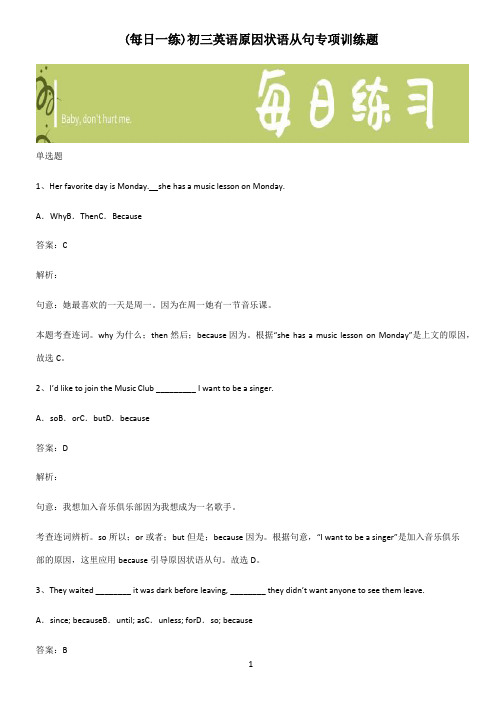
(每日一练)初三英语原因状语从句专项训练题单选题1、Her favorite day is Monday.she has a music lesson on Monday.A.WhyB.ThenC.Because答案:C解析:句意:她最喜欢的一天是周一。
因为在周一她有一节音乐课。
本题考查连词。
why为什么;then然后;because因为。
根据“she has a music lesson on Monday”是上文的原因,故选C。
2、I’d like to join the Music Club _________ I want to be a singer.A.soB.orC.butD.because答案:D解析:句意:我想加入音乐俱乐部因为我想成为一名歌手。
考查连词辨析。
so所以;or或者;but但是;because因为。
根据句意,“I want to be a singer”是加入音乐俱乐部的原因,这里应用because引导原因状语从句。
故选D。
3、They waited ________ it was dark before leaving, ________ they didn’t want anyone to see them leave. A.since; becauseB.until; asC.unless; forD.so; because答案:B句意:他们一直等到天黑才离开,因为他们不想让任何人看到他们离开。
考查连词辨析。
since自从;until直到……时候;unless除非,如果不;so因此,所以;because因为;as因为;for因为,为了。
根据句意可知,第一个空表示“一直等到……时候”,应用until引导时间状语从句;第二个空as引导的是原因状语从句。
故选B。
4、I didn’t accept his help ________ I wanted to try it myself.A.becauseB.thoughC.untilD.unless答案:A解析:句意:我没有接受他的帮助,因为我想自己试一试。
高中原因状语从句及练习(含答案)教学提纲
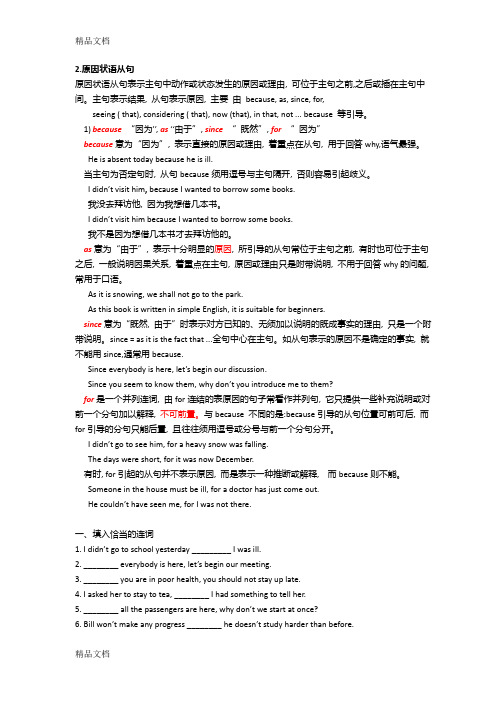
2.原因状语从句原因状语从句表示主句中动作或状态发生的原因或理由, 可位于主句之前,之后或插在主句中间。
主句表示结果, 从句表示原因, 主要由because, as, since, for,seeing ( that), considering ( that), now (that), in that, not ... because 等引导。
1) because“因为’’, as‘‘由于”, since “既然”, for“因为”because意为“因为”, 表示直接的原因或理由, 着重点在从句, 用于回答why,语气最强。
He is absent today because he is ill.当主句为否定句时, 从句because须用逗号与主句隔开, 否则容易引起歧义。
I didn’t visit him, because I wanted to borrow some books.我没去拜访他, 因为我想借几本书。
I didn’t visit him because I wanted to borrow some books.我不是因为想借几本书才去拜访他的。
as意为“由于”, 表示十分明显的原因, 所引导的从句常位于主句之前, 有时也可位于主句之后, 一般说明因果关系, 着重点在主句, 原因或理由只是附带说明, 不用于回答why的问题, 常用于口语。
As it is snowing, we shall not go to the park.As this book is written in simple English, it is suitable for beginners.since意为“既然, 由于”时表示对方已知的、无须加以说明的既成事实的理由, 只是一个附带说明。
since = as it is the fact that ...全句中心在主句。
如从句表示的原因不是确定的事实, 就不能用since,通常用because.Since everybody is here, let’s begin our discussion.Since you seem to know them, why don’t you introduce me to them?for是一个并列连词, 由for连结的表原因的句子常看作并列句, 它只提供一些补充说明或对前一个分句加以解释, 不可前置。
原因状语从句练习题及答案
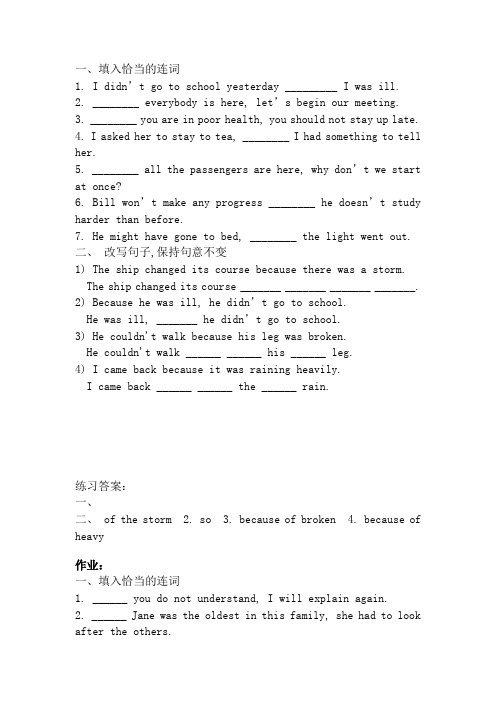
一、填入恰当的连词1. I didn’t go to school yesterday _________ I was ill.2. ________ everybody is here, let’s begin our meeting.3. ________ you are in poor health, you should not stay up late.4. I asked her to stay to tea, ________ I had something to tell her.5. ________ all the passengers are here, why don’t we start at once?6. Bill won’t make any progress ________ he doesn’t study harder than before.7. He might have gone to bed, ________ the light went out.二、改写句子,保持句意不变1) The ship changed its course because there was a storm. The ship changed its course _______ _______ _______ _______.2) Because he was ill, he didn’t go to school.He was ill, _______ he didn’t go to school.3) He couldn't walk because his leg was broken.He couldn't walk ______ ______ his ______ leg.4) I came back because it was raining heavily.I came back ______ ______ the ______ rain.练习答案:一、二、 of the storm 2. so 3. because of broken 4. because of heavy作业:一、填入恰当的连词1. ______ you do not understand, I will explain again.2. ______ Jane was the oldest in this family, she had to look after the others.3. He must be ill, ______ he is absent today.4. The teacher must be strict with you ______they want you to make great progress.5. _____your father is well again, you no longer have anything to worry about.6. The day breaks, _____the birds are singing.7. ______ you are ill, you’d better go to see the doctor.8. ______ she was late for class, she had to say sorry.二、选择恰当的答案1. The man can’t get on the bu s ______ there is no room on it.A. thoughB. becauseC. until D so that2. ______ her daughter hadn’t come back, ______ she looked worried.A. Because, /B. Because, soC. Though, butD. Though, /you’ve got a chance, you might make fu ll use of it.A. Now thatB. AfterC. AlthoughD. As soon as4. He found it difficult to read, _______ his eyesight was beginning to fail.A. andB. forC. butD. or5. A man cannot smile like a child, ________ a child smiles with his eyes, while a man smiles with his lips alone.A. soB. butC. andD. for答案:一、 2. As 3. for 4. because 5. Since 6. for 7. Since 8. As二、。
小学语文:原因状语从句练习

小学语文:原因状语从句练习
一、什么是原因状语从句?
原因状语从句是一个句子中用来表示某个动作或情况的原因的
从句。
它通常由连词“因为”、“由于”、“既然”、“由此可见”等引导。
二、原因状语从句的结构和用法
原因状语从句的结构是由引导词+主句构成。
引导词通常放在
句首,后面跟着一个完成的句子。
以下是一些常用的引导词和例句:
因为:因为下雨,所以我没有去公园。
由于:由于他生病了,所以没能参加比赛。
既然:既然你不喜欢这个节目,我们就换一个吧。
由此可见:由此可见,他非常努力。
也许:也许是他太累了,所以睡不着觉。
原因状语从句常常用来解释一个事件或情况发生的原因。
通过使用原因状语从句,我们可以更清楚地表达自己的意思,让其他人更容易理解。
三、原因状语从句的练习题
请根据下面的句子,在空白处填上合适的原因状语从句。
1.我没去上学,___我生病了。
2.她没赢得比赛,___她没有好好训练。
3.他迟到了,___他睡过头了。
4.___你不喜欢这个电影,我们就去看其他的吧。
5.我们要节约用水,___水是宝贵的资源。
参考答案:
1.因为
2.因为
3.因为
4.既然
5.因为
四、总结
通过学习原因状语从句,我们可以更准确地表达事件或情况的原因,使语言更加丰富和准确。
希望同学们在练习中能够熟练掌握原因状语从句的用法,并在写作中灵活运用。
【英语】英语状语从句题20套(带答案)含解析
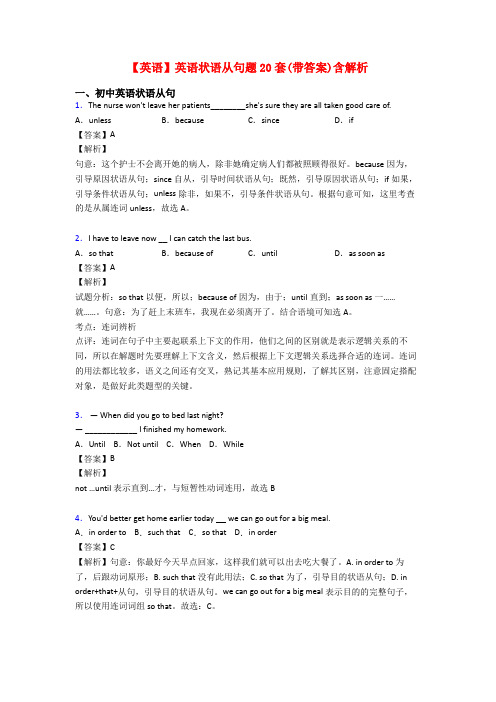
【英语】英语状语从句题20套(带答案)含解析一、初中英语状语从句1.The nurse won't leave her patients________she's sure they are all taken good care of. A.unless B.because C.since D.if【答案】A【解析】句意:这个护士不会离开她的病人,除非她确定病人们都被照顾得很好。
because因为,引导原因状语从句;since自从,引导时间状语从句;既然,引导原因状语从句;if如果,引导条件状语从句;unless除非,如果不,引导条件状语从句。
根据句意可知,这里考查的是从属连词unless,故选A。
2.I have to leave now __ I can catch the last bus.A.so that B.because of C.until D.as soon as【答案】A【解析】试题分析:so that以便,所以;because of因为,由于;until直到;as soon as一……就……。
句意:为了赶上末班车,我现在必须离开了。
结合语境可知选A。
考点:连词辨析点评:连词在句子中主要起联系上下文的作用,他们之间的区别就是表示逻辑关系的不同,所以在解题时先要理解上下文含义,然后根据上下文逻辑关系选择合适的连词。
连词的用法都比较多,语义之间还有交叉,熟记其基本应用规则,了解其区别,注意固定搭配对象,是做好此类题型的关键。
3.— When did you go to bed last night?— ____________ I finished my homework.A.Until B.Not until C.When D.While【答案】B【解析】not …until 表示直到…才,与短暂性动词连用,故选B4.You'd better get home earlier today we can go out for a big meal.A.in order to B.such that C.so that D.in order【答案】C【解析】句意:你最好今天早点回家,这样我们就可以出去吃大餐了。
(文末有答案)2022学年度初中英语原因状语从句典型例题
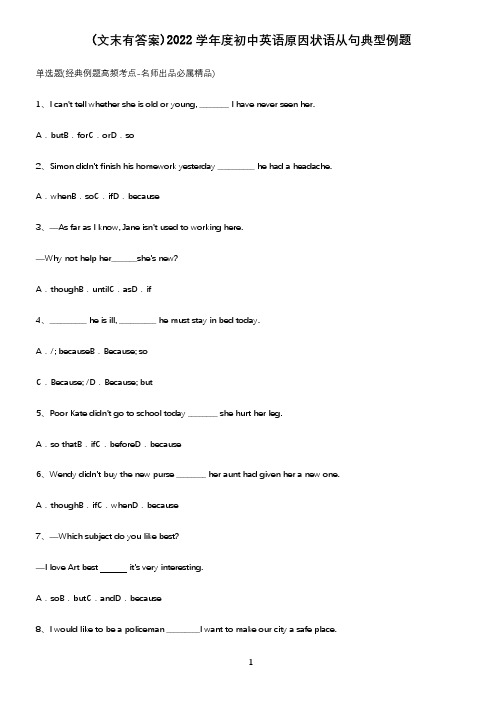
(文末有答案)2022学年度初中英语原因状语从句典型例题单选题(经典例题高频考点-名师出品必属精品)1、I can't tell whether she is old or young, ________ I have never seen her. A.butB.forC.orD.so2、Simon didn’t finish his homework yesterday __________ he had a headache. A.whenB.soC.ifD.because3、—As far as I know, Jane isn't used to working here.—Why not help her_______she's new?A.thoughB.untilC.asD.if4、__________ he is ill, __________ he must stay in bed today.A./; becauseB.Because; soC.Because; /D.Because; but5、Poor Kate didn’t go to school today ________ she hurt her leg.A.so thatB.ifC.beforeD.because6、Wendy didn’t buy the new purse ________ her aunt had given her a new one. A.thoughB.ifC.whenD.because7、―Which subject do you like best?―I love Art best it's very interesting.A.soB.butC.andD.because8、I would like to be a policeman _________I want to make our city a safe place.A.whenB.beforeC.afterD.because9、I’d like to be a doctor ________ I want to help sick people. A.soB.butC.becauseD.if10、I don’t like Sun Cinema ________ it has bad service. A.becauseB.althoughC.but11、I did it ______ he told me to.A.thatB.whyC.because12、Rebeca often catches a cold ________ she has an unhealthy eating habit. A.soB.butC.becauseD.or13、I always get up early on weekdays, ________ I'm afraid I will be late for school. A.becauseB.soC.thoughD.then14、—Did you give Dick a call?—I didn’t need to ______ I’ll see him soon. A.whenB.throughC.untilD.because15、I can’t do it now ______ I am busy. A.thoughB.becauseC.untilD.after16、She is very happy ________ she has got many good friends. A.orB.becauseC.but17、My brother doesn’t like math __________ he thinks it is boring. A.soB.andC.butD.because18、I like birds ________ they are beautiful.A.andB.butC.becauseD.or19、He failed the exam ____________ he was too careless.A.althoughB.butC.because20、— Do you know a new shopping mall opened in our town yesterday?—Yes. Why don’t we pay a visit________we have time?A.untilB.sinceC.unlessD.though21、The doctor looks tired and sleepy _________ he stayed up late to look after his patients yesterday. A.becauseB.ifC.unless22、Kim really wants to join the Food and Drink Club ________ he likes cooking. A.soB.becauseC.orD.but23、We love animals ________ they are our friends.A.butB.soC.orD.because24、My brother and I like lions ________ they are big and beautiful. A.ifB.soC.butD.because25、I hope to go to France some day ________ there are many famous museums. A.thoughB.unlessC.becauseD.where26、We didn’t enjoy the music _______ there was a sudden rain. A.ifB.becauseC.thatD.although27、I can’t read the book__________ there are too many new words in it.A.becauseB.soC.butD.and28、Lisa doesn’t like watching TV programs _______ there are too many ads . A.whileB.becauseC.thoughD.so29、I don’t like science _______ it’s difficult for me.A.butB.andC.because30、Bring a sweater _________ it is cold in the evening.A.becauseB.soC.forD.but31、She is very happy ________ she has got many good friends.A.orB.becauseC.butD.though32、I couldn't sleep well last night _____________ there was so much noise outside. A.soB.butC.becauseD.if33、Jack's wife wants him to work for another three years ________ their house will be paid off in three years. A.becauseB.unlessC.butD.or34、We don't like Jack ______ he never helps others.A.butB.soC.because35、The restaurant is very popular ____ it offers a wide variety of delicious food at low prices.A.althoughB.becauseC.beforeD.until36、Lily had to walk home last night ________ her bike was broken.A.beforeB.becauseC.if37、________everyone is here, let's begin our discussion right away.A.IfB.WhenC.Now thatD.Even if38、_______ China is growing stronger and stronger, Chinese is taught in more and more countries. A.IfB.UnlessC.AsD.Although39、I can’t go cycling with you ________ I have too much homework to do. A.butB.soC.becauseD.though40、________we've got a few minutes to wait for the train, let's have a cup of coffee. A.ThoughB.UnlessC.SinceD.Until41、Students today have a lot of pressure (压力) _____ they have to learn too much knowledge at school. A.in order toB.unlessC.becauseD.because of42、—Will you go anywhere on Saturday, Daming?—I will stay at home ________ the weather report says that it will rain heavily. A.andB.butC.becauseD.so43、Mary choose to find a job after graduation ________ she didn’t want to depend on her parents. A.ifB.althoughC.becauseD.unless44、He didn’t go to school yesterday he was ill.A.althoughB.ifC.because45、In China, we always use red paper for Hongbao ________ red means luck. A.untilB.ifC.althoughD.because46、_____ he is very busy, _____ he can't come.A.so ;becauseB.Because ;soC.Because; /47、一Have you returned Helen's call?一I don't need to I'll see her tomorrow.A.ifB.unlessC.soD.because48、________ this is your first visit to China, you’d better learn some Chinese culture. A.UnlessB.AlthoughC.Now thatD.Even if49、She didn’t send the e-mail yesterday _________ it was too late.A.ifB.afterC.beforeD.because50、I love Sundays very much _____ I can get up late.A.soB.becauseC.but51、I didn't buy it ________ I didn’t like the colour.A.untilB.soC.ifD.because52、The students like reading in the library it's air-conditioned A.becauseB.howeverC.thatD.where53、Stores are not allowed in primary schools________they often sell kids the food with high-fat, high-sugar, and high-salt.A.soB.becauseC.thoughD.unless54、I hate traveling by air______you usually have to wait for hours before the plane takes off. A.becauseB.thoughC.untilD.so that55、Nancy didn't go to school yesterday she had a fever.A.ifB.whenC.thoughD.because56、—I’m really proud of my group ___________ we won the match by working together.—How important the teamwork is!A.butB.soC.becauseD.or57、he sleeps all day, he is very lazy.A.Because,soB.So,becauseC.Because,/D.So,/58、________ the COVID-19 is still spreading rapidly, getting a vaccine(疫苗)is quite necessary. A.BeforeB.SinceC.AlthoughD.Unless59、I like English _____________it's interesting.A.becauseB.beforeC.afterD.when60、—The local snack tastes spicy and sweet.—Well, ___________ you are here, why not have a try? A.sinceB.becauseC.thoughD.unless61、My father didn't go to work yesterday ________ I was ill.A.becauseB.because ofC.ifD.so62、It’s hard for us to say goodbye _________ we have so many happy day to remem ber. A.soB.untilC.althoughD.because63、—________ do you like animals?—________ they are cute.A.Why; BecauseB.Why; SoC.What; BecauseD.What; So64、I like English ________ English is very important.A.butB.orC.soD.because65、I like spring ______ I like green.A.butB.andC.because66、________you can’t answer the question, maybe we’d better ask someone else. A.SinceB.SoC.UnlessD.Although67、 you know little about the Qing and Ming dynasties,you'd better read more books about them. A.UnlessB.SinceC.AlthoughD.Whether68、I like Tu Youyou ________ she is a great scientist.A.orB.becauseC.butD.so69、I don’t like to make friends with Tom ________ he always tells lies. A.whenB.beforeC.ifD.because70、He missed(错过)his first class________he got up late.A.orB.soC.because71、Jenny likes Tuesday ________ her favorite subject is on Tuesday.A.afterB.butC.soD.because72、Linda didn’t come to school this morning ______ she was ill.A.butB.andC.soD.because73、Linda was just going out shopping________the telephone rang. A.whileB.whenC.afterD.because74、Mum likes red because it always brings good luck to her.A.定语B.状语C.宾语D.表语75、—Music and art have been added to high school entrance examinations. —I think this decision is made________students need to develop in many ways. A.becauseB.althoughC.unless76、________ Sarah isn’t fine, ________ she doesn’t go to school. A.Because; soB.So; /C.So; becauseD.Because; /77、I don’t really like tennis________I’m not very good at it. A.butB.becauseC.althoughD.when78、—Ben is a really hard-working student.—He studies so hard ________ he wants to enter No. 3 High School. A.thatB.becauseC.if79、一What shall we do now?一 __________ it's raining hard, let's stay at home. A.SoB.SinceC.HoweverD.Otherwise80、I didn’t go to school _________ I was b adly ill. A.soB.unlessC.althoughD.because81、—I don’t like the game ________ it’s so boring.—OK. I see.A.butB.soC.becauseD.why82、It’s good to eat lots of vegetables ________ it helps you stay healthy. A.orB.becauseC.butD.although83、The exam must be very difficult, ________ many students failed. A.thoughB.soC.forD.but84、There will be less pollution _______ more people use public transportation. A.becauseB.andC.ifD.so85、Bob wants to be a writer when he grows up _________ he enjoys writing stories. A.orB.butC.thoughD.because(文末有答案)2022学年度初中英语原因状语从句_031参考答案1、答案:B解析:句意:我分不清她是老是年轻。
高中英语原因状语从句形式单选题40题
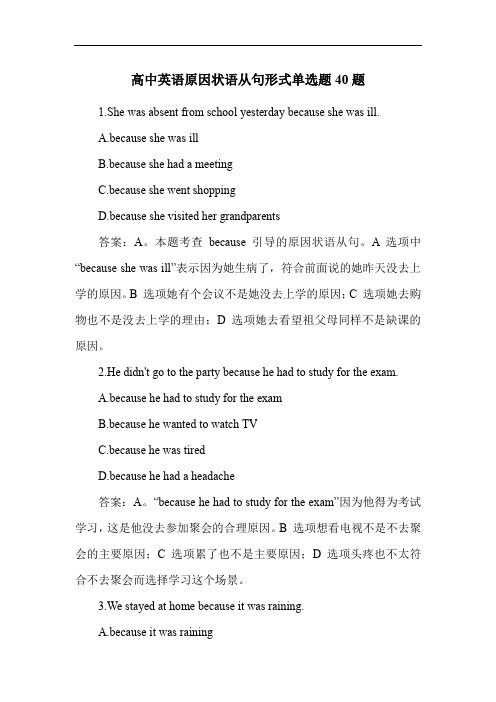
高中英语原因状语从句形式单选题40题1.She was absent from school yesterday because she was ill.A.because she was illB.because she had a meetingC.because she went shoppingD.because she visited her grandparents答案:A。
本题考查because 引导的原因状语从句。
A 选项中“because she was ill”表示因为她生病了,符合前面说的她昨天没去上学的原因。
B 选项她有个会议不是她没去上学的原因;C 选项她去购物也不是没去上学的理由;D 选项她去看望祖父母同样不是缺课的原因。
2.He didn't go to the party because he had to study for the exam.A.because he had to study for the examB.because he wanted to watch TVC.because he was tiredD.because he had a headache答案:A。
“because he had to study for the exam”因为他得为考试学习,这是他没去参加聚会的合理原因。
B 选项想看电视不是不去聚会的主要原因;C 选项累了也不是主要原因;D 选项头疼也不太符合不去聚会而选择学习这个场景。
3.We stayed at home because it was raining.A.because it was rainingB.because we were boredC.because we had no moneyD.because we wanted to sleep答案:A。
“because it was raining”因为下雨,所以我们待在家里,逻辑合理。
原因-目的-结果状语从句及练习
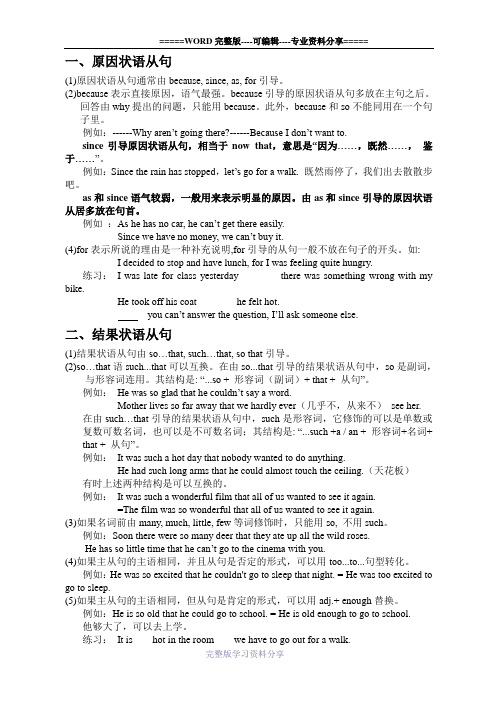
一、原因状语从句(1)原因状语从句通常由because, since, as, for引导。
(2)because表示直接原因,语气最强。
because引导的原因状语从句多放在主句之后。
回答由why提出的问题,只能用because。
此外,because和so不能同用在一个句子里。
例如:------Why aren’t going there?------Because I don’t want to.since引导原因状语从句,相当于now that,意思是“因为……,既然……,鉴于……”。
例如:Since the rain has stopped,let’s go for a walk. 既然雨停了,我们出去散散步吧。
as和since语气较弱,一般用来表示明显的原因。
由as和since引导的原因状语从居多放在句首。
例如:As he has no car, he can’t get there easily.Since we have no money, we can’t buy it.(4)for表示所说的理由是一种补充说明,for引导的从句一般不放在句子的开头。
如:I decided to stop and have lunch, for I was feeling quite hungry.练习:I was late for class yesterday _______ there was something wrong with my bike.He took off his coat _______ he felt hot.you can’t answer the question, I’ll ask someone else.二、结果状语从句(1)结果状语从句由so…that, such…that, so that引导。
(2)so…that语such...that可以互换。
在由so...that引导的结果状语从句中,so是副词,与形容词连用。
- 1、下载文档前请自行甄别文档内容的完整性,平台不提供额外的编辑、内容补充、找答案等附加服务。
- 2、"仅部分预览"的文档,不可在线预览部分如存在完整性等问题,可反馈申请退款(可完整预览的文档不适用该条件!)。
- 3、如文档侵犯您的权益,请联系客服反馈,我们会尽快为您处理(人工客服工作时间:9:00-18:30)。
原因状语从句练习题:
一、填入恰当的连词
1. I didn’t go to school yesterday _________ I was ill.
2. ________ everybody is here, let’s begin our meeting.
3. ________ you are in poor health, you should not stay up late.
4. I asked her to stay to tea, ________ I had something to tell her.
5. ________ all the passengers are here, why don’t we start at once?
6. Bill won’t make any progress ________ he doesn’t study harder than before.
7. He might have gone to bed, ________ the light went out.
二、改写句子,保持句意不变
1) The ship changed its course because there was a storm. The ship changed its course _______ _______ _______ _______. 2) Because he was ill, he didn’t go to school.
He was ill, _______ he didn’t go to school.
3) He couldn't walk because his leg was broken.
He couldn't walk ______ ______ his ______ leg.
4) I came back because it was raining heavily.
I came back ______ ______ the ______ rain.
练习答案:
一、1.because 2.Since 3.As 4.because 5.Since 6.because
7.for
二、1.because of the storm 2. so 3. because of broken 4. because of heavy
作业:
一、填入恰当的连词
1. ______ you do not understand, I will explain again.
2. ______ Jane was the oldest in this family, she had to look after the others.
3. He must be ill, ______ he is absent today.
4. The teacher must be strict with you ______they want you to make great progress.
5. _____your father is well again, you no longer have anything to worry about.
6. The day breaks, _____the birds are singing.
7. ______ you are ill, you’d better go to see the doctor.
8. ______ she was late for class, she had to say sorry.
二、选择恰当的答案
1. The man can’t get on the bus ______ there is no room on it.
A. though
B. because
C. until D so that
2. ______ her daughter hadn’t come back, ______ she looked worried.
A. Because, /
B. Because, so
C. Though, but
D. Though, /
3._______ you’ve got a chance, you might make full use of it.
A. Now that
B. After
C. Although
D. As soon as
4. He found it difficult to read, _______ his eyesight was beginning to fail.
A. and
B. for
C. but
D. or
5. A man cannot smile like a child, ________ a child smiles with
his eyes, while a man smiles with his lips alone.
A. so
B. but
C. and
D. for
答案:一、1.since 2. As 3. for 4. because 5. Since 6. for 7. Since 8. As
二、1.B 2.A 3.A 4.B 5.D。
